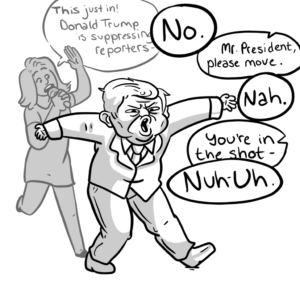The staff editorial is the majority opinion of The Murray State News Editorial Board.
 How the press covers news has evolved over the years, as has the medium through which the news is reported. However, the reporter’s purpose has not changed: educate and inform the masses to ensure they vote. It’s a simple premise, but one which party politics and the “fake news” crusade has hampered. Even President Donald Trump hasn’t shied away from attacking the credibility of most all news media except Fox News.
How the press covers news has evolved over the years, as has the medium through which the news is reported. However, the reporter’s purpose has not changed: educate and inform the masses to ensure they vote. It’s a simple premise, but one which party politics and the “fake news” crusade has hampered. Even President Donald Trump hasn’t shied away from attacking the credibility of most all news media except Fox News.
The citizenry of our nation and those who report the news must reconcile their symbiotic relationship, and fast. Without news media, the everyday person will lose a vital source of information which directly impacts their day-to-day life; without re-establishing trust in its readership, news media will face far greater struggles than just advertising shortfalls.
We, The Murray State News Editorial Board, propose there is work to be done on both sides if our nation wishes to rise above the lies and vitriol and restore this vital component of our democracy.
What has, in part, created the rift in trust between reporters and readers is what is being reported, and how. At a time when readers are being bombarded with information from all corners of the internet, the content we report and how much bias slips through is critical.
According to a new Knight-Gallup survey, eight in every 10 U.S. adults believe news is key to democracy. However, “seventy-three percent of Americans say the spread of inaccurate information on the internet is a major problem with news coverage today,” according to the same survey. The trustworthiness of true, unbiased reporting is on the line and, to some readers, is already beyond salvaging.
Until social media platforms begin to take the issue of fake, biased “news” seriously, it’s up to established news media organizations to take a stand. Unfortunately, partisan politics and the influences of telecommunication companies such as Sinclair Broadcasting Group means this unity will likely never happen.
As advertising revenue falls and the future of internet content becomes uncertain, some may turn to the NPR news model in order to continue operations and preserve their credibility.
NPR is a non-profit media organization that has been praised for its mostly unbiased reporting, in part due to not being beholden to the whims of advertisers and other entities. The organization’s interests lie in reporting, not pandering to politicians.
The public is bombarded with news from hundreds or thousands of sources every day; if some of these sources were to go by the wayside in a non-profit shift, we would all likely be better off.
Wholly blaming the news media for this problem would be doing everyone a disservice – the public must bear their own share.
As the number of news sources grows, readers must relearn to discern fact from fiction. Conscious critical thought plays an important role in how news is assimilated and spread. False news stories can be shared via Facebook millions of times in a day, while a CNN report may be shared only a few thousand because of a lack of due diligence.
Sensationalized political media sells because it’s emotion driven. Once the everyday reader reigns in their personal views and emotions to scrutinize all news sources, more unbiased reporting based on fact will get screen (and page) time once again.
This situation will not simply resolve itself overnight. As long as there is an opponent of the unbiased press in the White House, we are all facing an uphill battle. But with some time, perhaps democracy, and the people, will win out in the end.




























































































